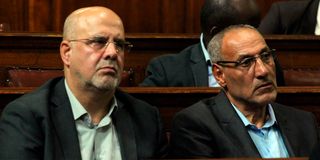Breaking News: At least 10 feared to have drowned in Makueni river
State defends mysterious release of two Iranian terrorists from Kamiti prison

Iranians Sayed Mansour Mousavi (right) and Ahmed Abolfathi Mohammed at the Supreme Court of Kenya on December 11, 2018.
The government last evening maintained that the two Iranian terrorists mysteriously released from Kamiti Maximum Security Prison were freed after applying for an early pardon as their time behind bars was almost complete.
This is as confusion raged as to whether terror suspects are also eligible for pardon through the power of mercy committee, a constitutional body created to evaluate and release prisoners who are almost completing their sentences and have been on good behaviour while in prison.
Ahmed Aboulfathi Mohamad and Sayed Mansour Mousav were arrested in June 2012 on suspicion of plotting terror attacks against American and Israeli targets in Nairobi.
They then led detectives to the Mombasa Sports Club where they had hidden 33 kilos of explosive materials which they had allegedly planned to use for their terror mission while in the country.
A Magistrates court later sentenced them to life in prison, but the term was reduced to 15 years when they appealed at the High Court.
Unsatisfied with the (High Court’s) ruling, the two suspects went to the Court of Appeal, which set them free.
Their freedom was, however, short-lived as they were immediately re-arrested after the Director of Public Prosecutions (DPP) moved to the Supreme Court seeking for their life sentence to be reinstated.
The Supreme Court rejected the DPP’s appeal and instead sentenced the two to the 15-year sentence that had been meted on them by the High Court.
In their ruling, Justices David Maraga, Jackton Ojwang and Njoki Ndung’u said that circumstantial evidence had placed the two at the scene where the deadly explosives were discovered.
“The circumstantial evidence on record points to the respondents as the people who planted the explosive at the scene where it was dug out. There’s no evidence of anyone else having previously planted anything in Mombasa Gold Course and, particularly, in the vicinity of hole number nine,” the judges noted in March 2019.
However, while in prison a botched plan to facilitate the escape of the two terror suspects was linked to the Iranian Ambassador to Kenya Hadi Farajvand after two individuals who had landed in the country were arrested by the Anti-Terror Police Unit for being in Kenya illegally.
Since then, little has been heard of Ahmed Aboulfathi Mohamad and Sayed Mansour Mousav until it emerged yesterday that they had been silently released from Kamiti two weeks ago and deported to Iran.
They had five years remaining on their prison sentence.
While the 2010 Constitution allows for prisoners who are at the tail end of their sentences to apply for early release, this is the first time the country has witnessed the setting free of such high level suspects.
Kenya Prisons Service Director of Communications George Dianga termed their release as above board as the two were almost finishing their sentences, and that they were eligible to apply for early release as guaranteed by the law.
“Article 136 of the Constitution says anyone can petition the President through the Power of Mercy Committee and prisoners do this all the time,” he said.
“You can be released from prison in three ways; finishing your sentence, appealing successfully or applying to the power of mercy committee. Furthermore, every prisoner is also entitled to remission where a third of your sentence is reduced as so long as you behave well while in prison,” he explained.
According to Mr Dianga, who is also an assistant commissioner of prisons, the two suspects were supposed to be released in May next year after reducing their sentences through remission.
He explained that since they had only one year on their sentences, the two opted to apply for early release, which was granted on June 1, when retired President Uhuru Kenyatta pardoned 3,908 prisoners on Madaraka Day.
“Their release was delayed as we had to liaise with the immigration department for their deportation because they were in the country illegally,” said Mr Dianga





